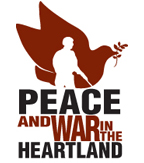History Theatre revisits the 'Peace
Crimes' of the Minnesota Eight
BY LISA PETERSON-DE LA CUEVA , TC DAILY PLANET
February 27, 2008
Ron Peluso has an open door policy when it comes to ideas
for plays. Peluso, artistic director of the History Theatre,
tells people to pop into his office if they have an idea.
Together they discuss whether the idea has stage potential.
That’s how Frank Kroncke ended up pitching a memoir
he had written about the Minnesota Eight.
Peluso ran with the story and turned it into Peace Crimes:
The Minnesota Eight
vs. the War. The play tells the story
of eight Vietnam War resisters who raided Minnesota draft
offices during the Vietnam War. The group stole draft cards
from the offices in an effort to prevent Minnesotans from
going to war. The FBI caught eight members of the group; most
served two years of five-year prison sentences.
The Minnesota Eight were somewhat of a ragtag team. “We
all resisted illegitimate authority,” says Kroncke,
a member of the group, “but we came from many different
backgrounds. We had a journalist, a theologian from the Roman
Catholic tradition, one guy with a history of science background…and
we were influenced by different people.” This is depicted
in Peace Crimes when members of the Minnesota Eight grapple
with strategic decisions on how and when to resist the draft.
After Peluso found Doris Baizley to write the play he partnered
up with the University of Minnesota. It seemed like a natural
fit, since many of the Minnesota Eight were graduates of the
University and some of the story’s events take place
on campus. Peluso also brought in theater MFA candidates from
the University; they make up 13 of the 18 cast members.
The involvement of the Minnesota Eight has been crucial. Kathleen
Hansen, managing director of the History Theatre, says, “The
[original Minnesota Eight] have been at the rehearsals and
have watched the students actually play them. They can answer
questions if the students have them and say, ‘Well,
that was actually tied to something that wasn’t in the
script.’ That really adds an extra layer of context.”
The group also weighed on details—telling the playwright
when an event as depicted differed from the actual events.
Members of the Minnesota Eight report that they enjoyed and
appreciated the process of creating Peace Crimes. Don Olson,
who now hosts a radio show at KFAI, said, “We actually
found out more about the details of the trial, and about how
people reacted to
the prison experience—something I didn’t know
everything about.”
The staging of Peace Crimes prompted Frank Kroncke to organize
educational events on college campuses in Minnesota. Kroncke
helped secure speakers like Jim Wallis and Daniel Ellsberg,
and coordinated events with groups like In the Heart of the
Beast Theater. These events are separate from the play, but
Kroncke hopes the events will generate interest in Peace Crimes.
The play itself is rich with historical information presented
in a variety of ways. Historical documents place the audience
in the midst of the Vietnam era. Pictures of Kent State, draft
cards, American and Vietnamese soldiers, and the U of M campus
flash across the stage and add nuance to the plot. The play
evokes a tension between the “flower power” and
“radical action” perspectives among protesters.
Take, for example, a moment when the jarring song “Break
on Through,” by the Doors, interrupts the Mamas and
the Papas’ wistful tune “California Dreamin’.”
These devices help develop some of the play’s central
questions, still relevant today. What does it mean to protest?
Is non-violent resistance treason, or can it be patriotic?
What is the most effective vehicle for change? The play doesn’t
slow down to deal with these issues through character development;
there are so many characters and time periods that the play
sometimes feels like a string of moral aphorisms tied together
only loosely. The plot is engaging, though, as it takes the
audience through tumultuous events that are still relevant
today.
Lisa Peterson-de la Cueva (peterson.delacueva@gmail.com) is
an educator and has taught in various contexts, including
junior high social studies and adult basic education.
Peace Crimes: The Minnesota Eight vs. the War, presented by
the History Theatre and University of Minnesota Theatre. Playing
through March 9 at the Rarig Center, 330 21st Ave. S., Minneapolis.
For tickets ($25), see historytheatre.com.
